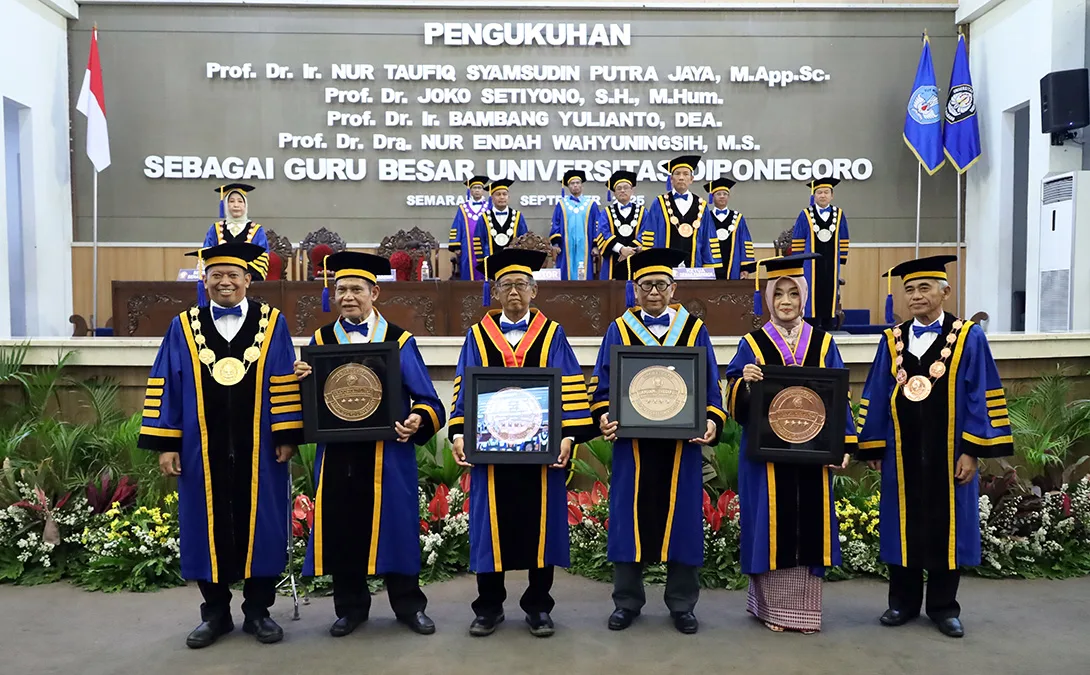UNDIP, Semarang (September 3, 2025) – Universitas Diponegoro inaugurated four new professors from different disciplines on September 2, 2025, at the Prof. Sudarto Building, UNDIP Tembalang Campus. The professors are Prof. Dr. Ir. Nur Taufiq Syamsudin Putra Jaya, M.App.Sc. and Prof. Dr. Ir. Bambang Yuliyanto, DEA., from the Faculty of Fisheries and Marine Science; Prof. Dr. Joko Setiyono, S.H., M.Hum., from the Faculty of Law; and Prof. Dr. Dra. Nur Endah Wahyuningsih, M.S., from the Faculty of Public Health.
Chair of the UNDIP Academic Senate, Prof. Ir. Edy Rianto, M.Sc., Ph.D., I.P.U., said the addition of new professors increases the university’s academic strength. “Currently, UNDIP has 252 active professors, consisting of 230 permanent and 22 non-permanent,” he said.
He stated that a professorship is not only a recognition of expertise but also carries the responsibility to develop and share knowledge for the benefit of society and the nation’s progress.
“A professor should guide young lecturers and students in deepening and expanding their knowledge. They must also be role models both on and off campus,” Edy said.
UNDIP Rector, Prof. Dr. Suharnomo, S.E., M.Si., praised the new professors for their dedication and achievements. “Becoming a professor means one has completed their personal journey at the highest level of academic attainment. Professors are intellectuals who should serve as role models, willing to share knowledge and devote more time to serving the nation,” he said.
He also highlighted UNDIP’s recent achievements, including ranking among the top four nationally in Webometrics, top three in Scimago Institutions, and consistently second in UI GreenMetric rankings for the past five years.
“Reputation and academic dignity are important, but the greatest value is the benefit we bring to society. The best university is the one that benefits the most people,” Prof. Suharnomo said.
He urged the professors to be accurate role models in the face of modern challenges and inspire the younger generation to build a productive and ethical academic reputation.
Responding to current national unrest marked by demonstrations, he called for unity and empathy, quoting a Javanese proverb: “Rukun agawe santosa, crah agawe bubrah,” which means “Harmony brings strength, conflict brings ruin.”
Each professor also delivered a scientific oration on their research. Prof. Dr. Ir. Nur Taufiq Syamsudin Putra Jaya, M.App.Sc. presented on “Conservation of Eel (Anguilla Bicolor Bicolor): Toward Sustainable Management,” highlighting findings on Javanese eel biodiversity, survival rates, and potential for conservation-based investment.
Using DNA analysis, phylogeny, and several studies, the survival rate of Javanese eels is higher than that of eels from other regions of the Indian Ocean. Furthermore, these approaches demonstrate that the mating and hatching areas of Javanese eels are located in the Nias Waters. The study also found six other eel species coexisting with Javanese eels. This research demonstrates that Indonesia’s rich eel biodiversity can offer investment opportunities through conservation and diversification, despite the scarcity of eel supply in the global market.
Prof. Dr. Joko Setiyono, S.H., M.Hum. spoke on “Counterterrorism Policy Strategies in Indonesia as International Crimes in the Perspective of International Criminal Law.” The speech explained the implementation of state criminal jurisdiction based on the territorial principle, by creating National Legal instruments, ratifying International Law related to terrorism, establishing international cooperation, forming counterterrorism institutions, and involving the community in counterterrorism.
This strategy is considered crucial in addressing the threat of terrorism, which continues to evolve in tandem with the rapid advancements in science, technology, transportation, and communication.
Prof. Dr. Ir. Bambang Yulianto, DEA. addressed “Strategies for Controlling Heavy Metal Pollution to Support Coastal and Marine Ecosystem Conservation.” This study shows the presence of heavy metal pollution in water, sediment, and marine biota on the North Coast of Jawa Tengah.
He proposed a phytoremediation strategy utilizing mangroves and seaweed, along with depuration methods for shellfish, to effectively and economically reduce pollutants. Another strategy used is the shellfish depuration strategy, which involves removing pollutants and toxins from the soft tissue and shells of shellfish. This finding offers economic benefits through a practical, easy, and inexpensive method.
Prof. Dr. Dra. Nur Endah Wahyuningsih, M.S., delivered a presentation titled “New Innovations in Dengue Control: Hope from Genetic Technology and Community Support.” The research involved utilizing the natural bacteria Wolbachia, which can reduce the ability of mosquitoes to transmit the dengue virus. However, he emphasized that the success of Wolbachia-based control programs depends heavily on public acceptance.
Therefore, close collaboration between scientists, the government, and the community is needed to develop holistic, adaptive, and sustainable strategies. With the support of appropriate research and policies, this innovation is expected to significantly reduce the burden of dengue fever while improving people’s quality of life. (Public Communication/ UNDIP/ Nabila&As)










